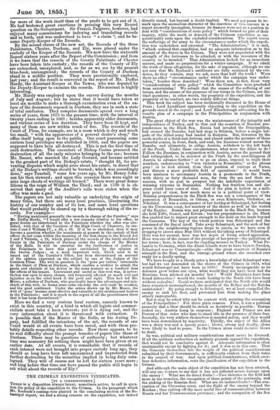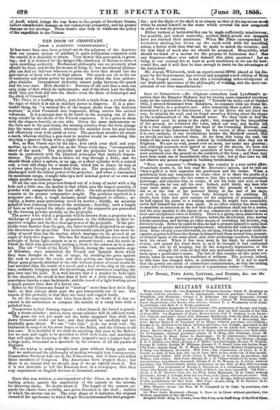THE CRIMEAN EXPEDITION VINDICATED.
[BY A CORRESPONDENT.]
TRP-RE IS a disposition always latent, sometimes active, to call in ques- tion the policy of the expedition to the Crimea. In the paragraph which Mr. Roebuck's casting-vote planted in the concluding section of the Se- bastopol report, we find a strong censure on the expedition, not indeed directly stated, but beyond a doubt implied. We need not pause to re- mark upon the anomalous character of the insertion of this censure in a report avowedly incomplete, because its framers were not in a position to deal with " considerations of state policy " which formed no part of their inquiry, while the merit or demerit of the Crimean expedition as an- questionably rests upon the excluded considerations. The report traces the sufferings of the army to the circumstances under which the expedi- tion was undertaken and executed. " The Administration," it is said, " which ordered that expedition, had no adequate information as to the amount of the forces in the Crimea. They were not acquainted with the strength of the fortresses to be attacked, or with the resources of the country to be invaded." That Administration looked for an immediate success, and made no preparations for a winter campaign. If we admit the truth of these allegations, for the sake of argument, although we are not sure that Mr. Roebuck's antitheses are fully sustained by the evi- dence, do they contain, may we ask, more than half the truth ? Were there no other "circumstances under which the campaign was under- taken," besides those described ? Were there not, in fact, those very "considerations of state policy" which the Committee were precluded from entertaining ? We submit that the causes of the suffering of our troops, and the causes of the presence of our troops in the Crimea, are dis- tinct questions ; in other words, the propriety of the expedition, and the propriety of its conduct, are two widely different things. This week the subject has been incidentally discussed in the House of Peers ; Lord Lyndhurst apparently objecting to the expedition on the grounds stated in the report ; and Lord Ellenborough advocating his fa- vourite plan of a campaign in the Principalities in conjunction with Austria.
The great object of the war was the maintenance of the integrity and independence of Turkey, and to that end the cessation of Russian pre- ponderance in the Black Sea. Russia had invaded the Principalities, had crossed the Danube, bad laid siege to Silistria, before a single bri- gade of the Allied army had landed in Bulgaria. But, thwarted by the earth-works of a third-rate fortress, and placed under the pressure of three powerful armies, in front, flank, and rear, the Russians retired across the Danube, and ultimately, to oblige Austria, withdrew to the left bank of the Pruth. Under thew circumstances, what were the Allies to do ? Follow the Russians, in conjunction with Austria, across the ground they had relinquished, to be arrested at the Pruth by the unwillingness of Austria to advance further ? or to go on alone, exposed to triple their numbers, endeavouring to "win victories in Bessarabia," as the phrase goes ? or to look abroad, from their position of vantage at Varna, and discern a more profitable field of operations ? It would have been madness to accompany Austria in a promenade to the Pruth, with thirty or forty thousand men, far from the sea and their re- sources, with no goal in prospect but the indefinite expectation of winning victories in Bessarabia. Nothing but fruitless loss and dis- grace could have conic of that. And if the plan is hollow in a mili- tary point of view, how much more so in a political point of view. Russian preponderance in the Black Sea was not a consequence of the possession of Bessarabia, or Odessa, or even Kimbourn, Otchakov, or Nikolaief. It was a consequence of her footing at Sebastopol, her footing on the Circassian coast, her mastery of the shores as well as the waters of the Euxine. Russia was not preponderant in the Black Sea, because she held Tiflis, Gumri, and Erivan ; but her preponderance in the Black Sea enabled her to impart great strength to her hold on the lands beyond the Caucasus. The key of the whole position was Sebastopol and the command of the Sea'of Azoff. Take away Sebastopol, and the arch of her power in the neighbouring tegions drops to pieces, as we have seen it dropping to pieces since May 1854 without the taking away of Sebastopol. Here was her arsenal, here was her depot of living armed aggression. Here was one of the causes of the prestige of her power—the palladium of her terror ; here, in fact, was the standing menace to Turkey. What Po- land is to Germany, what the Aland Islands were to have been to Sweden, Sebastopol was to Constantinople—alike the great reservoir of Russia's strength in the East, and the vantage-ground where she crouched ever ready for a deadly spring.
We have bought at a bloody price a knowledge of what Sebastopol was; but had we not descended on the shores of the Crimea in 1854, what would Sebastopol not have been in 1855? Nearly inexpugnable as its defences grew before our eyes, what would they not have been had the Russians been allowed six months' law ? Would Balaklava have been found defenceless would the roads leading to the South side have been without redoubts ? Could we have anticipated that the North side would have remained unstrengthened, the mouths of the Belbec and the ICatcha undefended ? By going straight to Sebastopol, we at least compelled the enemy to sink his fleet, and prevented him from making the plus utterly impregnable. But it may be asked why not be content with securing the evacuation of the Principalities ? For three plain reasons. First, it was a political necessity that a blow should be struck as decisively as possible Europe looked on ; Austria hung in suspense ; England and France are not Powers of that order who dare to stand idle in the presence of their foes. Secondly, the very soldiers themselves demanded action, and they would ' have been demoralized by inactivity. Thirdly, the object of the Allies was a sharp war and a speedy peace ; blows, strong and deadly, alone were likely to lead to peace. In the Crimea alone could decisive blows be dealt.
In war, political and military considerations must never be divorced. If all the military authorities on military grounds opposed the expedition, that would not be conclusive against it. Adequate information is often unattainable except by fighting for -it; and it was so in this case. That the Generals themselves felt the weight of the political considerations submitted by their Governments, is sufficiently evident from their votes in the council of war. And upon political considerations, which over- bear defective information, rests the justification of the expedition to the Crimea.
And although the main object of the expedition has not been attained, will any one venture to say that it has not inflicted severe damage upon the enemy ? What are its direct fruits ?—Two victories in the field and more in the trenches, the occupation of three points of the peninsula, and the sinking of the Russian fleet. What are its indirect fruits ?—The eva- cuation of the Circassian coast, and the flight of the enemy beyond the %club= ; thus cutting off the most useful line of communication between Russia and her Transcaucasian provinces; and the occupation of the Sea of Azoff, which brings the war home to the people of Southern Russia, inflicts considerable damage on her commercial prosperity, and far greater damage on her prestige. These results also help to vindicate the policy of the expedition to the Crimea.



































 Previous page
Previous page